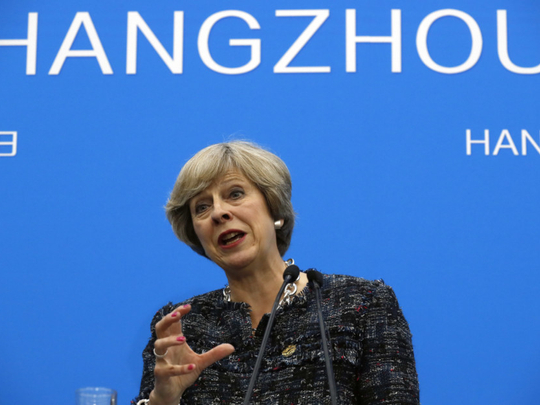
Calm, cautious, careful, with a dash of determined optimism and opportunities for all: such has been the impression created by Theresa May in her first two months as Britain’s Prime Minister. As she made her international summit debut at the G20 in China, the same caution and handcrafted realism seemed to be defining her approach to the world outside.
Her advanced comments trod a delicate line. “We will not be inward-looking; we will be a bold, outward-looking country.” (So no Little Englandism). “We will make trade deals around the world ... I am optimistic about the opportunities now open.” (Trade will always be our forte.) “We will be an independent Britain, forging our own way in the world.” (We will take back control.) Or on the other hand, the realist: “I am not going to pretend that all will be plain sailing.”
May is fortunate that her first big international occasion was the G20. A European Union (EU) summit would have been complicated for obvious reasons. The G7 makes the United Kingdom look smaller and poorer than it is. The G20 will have afforded her not only many more bilateral meetings in the margins, but a more accurate representation of the world that faces the UK in its post-EU future.
As a microcosm of the difficulties ahead — Japan’s warning about its UK car plants; the US confirming it won’t prioritise a UK trade deal — the forum could hardly be bettered. It also perfectly illustrated the opportunities — there’s a big wide world out there, where the UK, courtesy of history and geography, already has a network in place.
It might also be easier for May to take the UK into this wider world than it would have been for other recent prime ministers. With former prime minister David Cameron, there was always just a hint of the end of empire. The accent, the bearing, the nocturnal tantrum at an early EU summit, all limited his international appeal. If former prime minister Tony Blair had continued as the convinced European he started out, the UK would surely not be where it is today. Although he has retained something of the salesman — silver-tongued, but over-promising. Internationalist ambition, and an unrealistic idea of the country’s power, got the better of him.
May, on first acquaintance at least, has less baggage. There is a technocratic anonymity about her; a notable absence of ideology or ostentation, which was evident at the start of her trip to China. Visually, she and the Chancellor of the Exchequer, Philip Hammond, seemed almost indistinguishable from the British Airways staff at the top of the aircraft steps. But the experience of office the two have amassed, makes them unusually well-qualified for a new top team.
How far May can capitalise on the low-key pragmatism she has adopted to make Brexit succeed for the UK depends on how success is defined. But when she speaks of opportunities, she may not be completely wrong. This is not because of the supposedly good economic news of recent weeks, which risks being a short-term illusion, but because in foreign relations at least, Brexit could bring a long overdue clarity of purpose.
In the frenzy of politics that followed the referendum, little was made of the bigger cataclysm. It was not just that the UK had voted to leave the EU, it was that this one vote had, overnight, negated 50 years of British foreign policy. For the best part of the post-war period, successive prime ministers had been fixated on the EU (or its predecessors). They had sought membership, been rebuffed, tried again, been admitted and then agonised endlessly about its costs and benefits.
A new gauge of success
For all the complexity of the negotiations to come, that preoccupation can be no more. The UK must learn to survive — sink or swim — without the protective cocoon of the EU, and without all the excuses it offers. A new gauge of success will indeed be the country’s attractiveness as an economic partner. For the UK, there was always a spectre in its EU membership of the legacy of empire and the self-imposed “duty” to be an autonomous global player. Can Brexit perhaps help exorcise this ghost, too? Iraq, but not only Iraq, has left an aversion to intervention among UK voters. Brexit means that May must urgently reconsider what sort of international player the UK really wants to be.
If the answer is more regional than global, then this is where the relevance to the UK of Europe, if not of the EU, may return. As May set off for China, defeated Remainers thronged British streets to insist on their EU allegiance. It is a bit late, alas, for that. But if a large part of the Remain campaign’s problem was its association with an establishment elite, perhaps a pro-Europe movement that behaves with the creativity and commitment of an insurgency has prospects.
As a realist, Theresa May will know that 48 per cent is a constituency she cannot afford to ignore. Add her caution, and it could be as a regional player with a shorter, more selective reach that the UK, post-empire and post-EU, ultimately comes to rest.
— Guardian News & Media Ltd
Mary Dejevsky is a writer and broadcaster, a member of the Valdai Group and a member of the Chatham House think tank.










